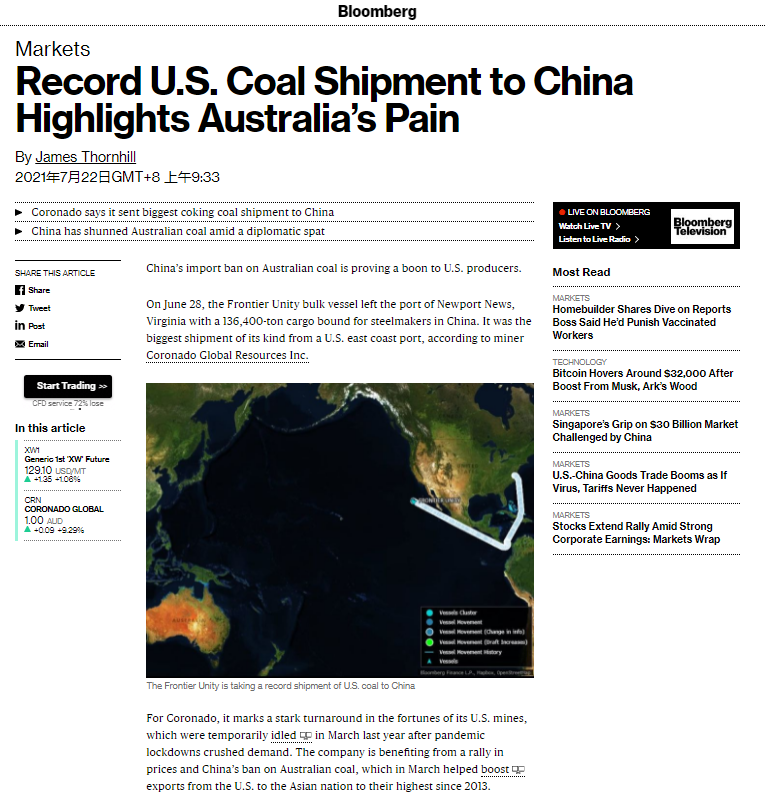
Editor's note: CGTN's First Voice provides instant commentary on breaking stories. The daily column clarifies emerging issues and better defines the news agenda, offering a Chinese perspective on the latest global events.
Recently, both the United States Trade Representative Katherine Tai and Japan's Ambassador to Australia Shingo Yamagami voiced support for Canberra's long-running trade dispute with Beijing. As stated by Foreign Ministry spokesperson Zhao Lijian, China has subjected Australia to import bans following a foreign policy by Scott Morrison that has wielded relentless hostility toward China, the country's largest export market.
Undeniably, the situation is a mess of Canberra's own making. Not only does it have nothing to do with the U.S. and Japan, but both of them are likewise benefiting enormously from exports entering the Chinese market, including taking up the space Australia has lost. This only illustrates how this so-called solidarity is motivated by anti-China geopolitics. When it comes to trade, they won't lift a finger for Australia.
It is amusing and laughable that Yamagami should say that Canberra is "managing its relationship with Beijing" better than Tokyo is. It was just announced that Japan's year-on-year export had surged by 48.6 percent, underpinned by a 27.7 percent increase in exports to China. Tokyo is riding the wave of China's recovery, rescuing its own COVID-19 woes.
Why would Japan want to be in the same position as Australia, where it loses huge portions of the market because of aggravating anti-China hostility? Encouraged by the United States, Japan enjoys talking the talk when it comes to China, but given its own trade position is so advantageous, its support for Australia is only hollow words.
Ironically, the same goes for the United States. While Washington has feigned support for Canberra on this trade matter, in practice, the U.S. has quickly capitalized on the hole Australia left in the market.
For example, Bloomberg recently reported that "record U.S. coal shipment to China highlights Australia's pain." It notes that U.S.-China trade has boomed retrospectively as if "the trade war never happened." The primary U.S. goal has been to expand its own market presence in China under the principle of "America First" and not other countries.

A screenshot of the Bloomberg article.
A screenshot of the Bloomberg article.
Thus, while Australia is America's military puppet in the Pacific manipulated to bark at China, Washington otherwise could not care less about Canberra's trade fortunes. The Biden administration has at large feigned a foreign policy of multilateralism directed at China, yet for all intents and purposes, it is just Trumpian economic nationalism sugarcoated to look more polite.
If American jobs go up, they don't care if Australian jobs go down. If the U.S. sells more coal, wheat and farm products to China, they don't care if Australia sells less. There is no such thing as joint trade solidarity because there are only differing commercial interests.
In this case, Australia's predicament is a mess of its own making and a situation that it can only get out of by reshaping its imprudent, inappropriate and vulgar attitude toward China. Beijing will treat Canberra fairly if it itself is treated fairly. It will, under no circumstances, accept the status quo where a relentlessly hostile American servitude state thinks it has the divine right to profit from Beijing existentially while spewing resentment, paranoia and callousness toward it.
Australia was the armpit of the British Empire in the past and is the armpit of the American one today.
The message is this: Don't expect the United States and Japan to come running to your aid when they themselves are indulging in the Chinese market. It's time for Australia to grow up and come to its senses.
(If you want to contribute and have specific expertise, please contact us at opinions@cgtn.com.)

